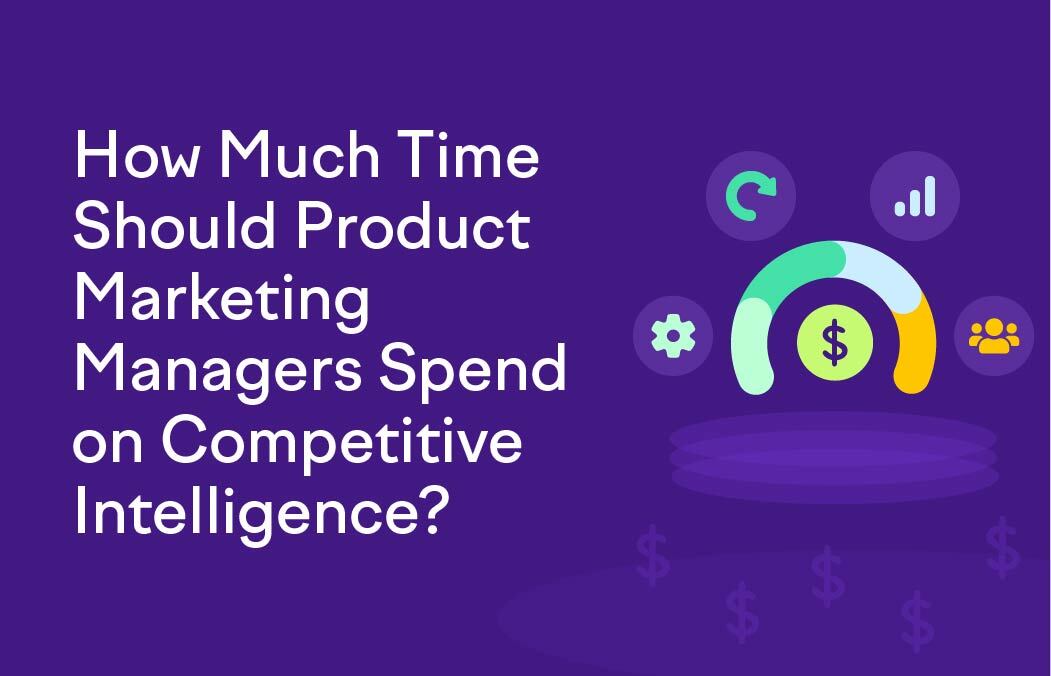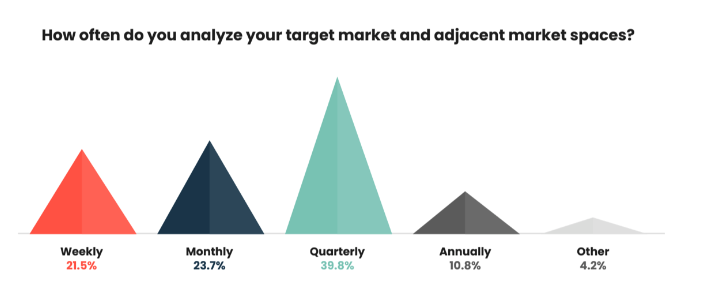How to create framework for managing product marketing priorities during a pandemic
How do you establish a baseline for product marketing during a global pandemic? We have 5 steps marketers should take to maximise their time during...
As a Product Marketing Manager responsible for competitive intelligence for your team, how much time should you spend on it and how can you find time to get it all done?

As a Product Marketing Manager (PMM), your time is invaluable. You’re the customer-facing product expert. You’re in charge of messaging, positioning, and creating sales collateral. To boot, you’re leading your team to success with your visionary roadmap for the future.
So, how can you efficiently conduct this essential research without losing yourself down a rabbit hole of data sources?
After reading this guide, you’ll walk away knowing more about:
Competitive intelligence shouldn’t be solely an annual, quarterly, or monthly effort—it’s a crucial ongoing function supporting sales enablement which adds incredible value to your team. But how much time should you spend on it each week?
Let’s dive in.
Competitive intelligence as a function, involves collecting, analyzing, and distributing information on your competition to improve your business strategy.
Product Marketing Managers or Competitive Intelligence Managers usually handle this, but the knowledge gained is useful for everyone in your company, particularly your sales team, who use competitive intelligence to win competitive deals.
Some examples of competitive intelligence insights include:
Product Marketing Managers are uniquely positioned to gather and analyze competitive intelligence due to their close involvement with both the product and sales teams. Larger teams may employ a Product Marketing Manager whose sole responsibility is competitive intelligence.
As a Product Marketing Manager, you understand your product’s features, benefits, and target audience, allowing you to assess how it compares to competitors.
By taking ownership of competitive intelligence, you can ensure a holistic view of the market landscape and can align product positioning, messaging, and marketing strategies accordingly.
And since you are likely also tasked with creating sales enablement assets such as Battlecards and sales decks, maintaining a close connection with competitor updates is crucial.
And with all this to be done for each competitor on your radar, it’s easy to see how much time can be spent—not to mention the fact that competitive intelligence is an ongoing process. Here’s why.
You may go through a lengthy competitive intelligence workflow and feel confident about the data you've gathered. But competitive intelligence is a continuous and evolving process rather than a one-time project.
Here are five reasons why:
Even if you have only a small handful of competitors, this could end up taking a huge amount of time—several hours per week for each of them at least—to stay on top of trends.
 source: Product Marketing Alliance
source: Product Marketing Alliance
So, the main question is, how much time should you allocate to competitive intelligence?
Well, it depends.
On what? The competitive intensity within your niche, the frequency with which your competitors alter their strategies, and the importance you place on keeping your Battlecards up-to-date.
Engaging in competitive intelligence can certainly be a time-consuming endeavor. It involves thorough research, meticulous analysis, and effective communication of findings to your teams. In fact, it can consume a significant part of your 40-hour work week.
Alternatively, using a competitive intelligence platform like Kompyte might require around 2-4 hours per week, allowing a balance between time spent on other tasks and the crucial need to update your Battlecards and all the teams who rely on your competitive intelligence program.
This approach ensures you stay well-informed while efficiently managing your workload—and keeping your whole team aligned.
If spending 2-4 hours per week on competitive intelligence sounds better than spending 15-20 hours per week on competitive intelligence, you’ll want to automate your program.
Rather than spending countless hours each week tracking and documenting your competitors’ every move, Kompyte harnesses the power of AI to deliver all the crucial updates you need to stay informed—and ultimately—win more sales.
For example, you’ll get real-time insights into your competitors’:
And much, much more.
The insights you need are then added to Battlecards and Reports automatically, meaning you can spend more time analyzing and acting on insights than on collecting, curating, and distributing them!
We love the ability to benchmark and track our competitor's marketing efforts in Kompyte. We get a clear picture of what our key competitors are doing in real-time, We evaluated the three best tools in this bracket, and Kompyte was clearly ahead. Onboarding has been well managed, well prepared and has set us up for success. - Jesse L., mid-market, verified G2 reviewer
Competitive intelligence is a critical function for Product Marketing Managers. By taking ownership of competitive intelligence, you can gather valuable insights, make informed decisions, and ensure your product stands out in a crowded market.
Streamlining the competitive intelligence process and leveraging appropriate tools and strategies allows you to prioritize customer-facing relationships while staying ahead of the competition. With a well-executed competitive intelligence strategy, you can enhance sales enablement, drive strategic decision-making, and ultimately contribute to the success of your product and company.
Streamline and simplify your competitive intel journey with Kompyte.
How do you establish a baseline for product marketing during a global pandemic? We have 5 steps marketers should take to maximise their time during...
Outdated information can make even the most competent members of your sales team look bad. Your team needs to know exactly what’s happening with your...
Is your team losing deals that you know they should have won? Watch on-demand as Pere Codina, Kompyte CEO, addresses how you can stop wasting time...
Be the first to know about new B2B SaaS Marketing insights to build or refine your marketing function with the tools and knowledge of today’s industry.